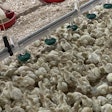Trace
mineral premixes are not expensive. But, when profitability is measured in
cents per broiler then basic raw materials like cereals and soy remain
expensive, as is
the case lately, then every cent counts! So, trace mineral premixes have not
escaped scrutiny in periodic poultry nutrition program reviews.
While enzyme
phytase remains expensive than that of phosphate mineral salts, phytase is a
common additive in most broiler diets. Up to now, however, the positive effects
of phytase on trace mineral digestibility, such as in the case of copper and zinc,
for example, have been sidelined. But, the question whether we should take into
account during formulation this synergistic effect keeps coming up due to
decreasing broiler profitability.
So
assuming that phytase will improve zinc digestibility in natural ingredients,
can we safely reduce inorganic additions of zinc through trace mineral
premixes? We accept, of course, that all margins of safety have been already
reevaluated and lowered where found exceeding current needs and practices.
Completely
removing trace mineral premixes from broiler diets has been researched
extensively, but its application remains patchy, and of course, regards the last few days before market age.
The question at hand regards the whole growth period, from day one until
market.
Perhaps,
we could ask the same question for layers diets, as well?

















